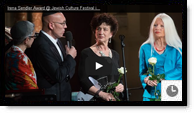Award Commemorates “Righteous Gentile” Sendler and Honors
Poles Who Preserve Jewish Heritage in Poland
SAN FRANCISCO — This July, Taube Philanthropies will honor the author of a banned book on Jewish life that U.S. diplomats helped her smuggle out of communist Poland and a theater director, who shook off neo-Nazi attacks to revive Jewish life in Lublin, with its 2014 Irena Sendler Memorial Award.
The prize, named for a Catholic Pole who saved hundreds of Jewish children from the Warsaw ghetto during Nazi occupation, will be presented at the Jewish Culture Festival in Kraków, Poland, on Friday evening, July 4, 2014, at 18:00 in the Tempel Synagogue.
“These two leading Polish citizens have shown admirable dedication to enriching and raising public awareness of Poland’s Jewish heritage, persevering to create widespread support and overcome residual local prejudices,” said Tad Taube, Chairman of Taube Philanthropies and Honorary Consul for the Republic of Poland in San Francisco.
 Honoree Małgorzata Niezabitowska is the award-winning co-author with her photographer husband Tomasz Tomaszewski of Remnants – The Last Jews of Poland, one of the first books to recognize and explore contemporary Jewish life in Poland, Solidarity activist, and a Council Member of the award-winning Museum of the History of Polish Jews, whose core exhibition opens in October in Warsaw. National Geographic published a cover story about Remnants in September 1986, when Niezabitowska was a Nieman Fellow at Harvard; but until now, she has never publicly told the story of how the manuscript was smuggled out.
Honoree Małgorzata Niezabitowska is the award-winning co-author with her photographer husband Tomasz Tomaszewski of Remnants – The Last Jews of Poland, one of the first books to recognize and explore contemporary Jewish life in Poland, Solidarity activist, and a Council Member of the award-winning Museum of the History of Polish Jews, whose core exhibition opens in October in Warsaw. National Geographic published a cover story about Remnants in September 1986, when Niezabitowska was a Nieman Fellow at Harvard; but until now, she has never publicly told the story of how the manuscript was smuggled out.
Her fellow recipient is Tomasz Pietrasiewicz, founder and director of the highly acclaimed Grodzka Gate—NN Theatre Center in Lublin. When neo-Nazis attacked his apartment with swastika-painted bricks, he pledged to continue to commemorate and educate about Lublin’s rich Jewish heritage through the arts.
The Irena Sendler Memorial Award, created in 2008 by Taube Philanthropies in memory of the courageous partisan whom Yad Vashem named a “Righteous Among The Nations,” is granted to Poles who preserve and revitalize their country’s Jewish heritage and are selected around the time of the May 12 anniversary of Sendler’s passing in 2008.
Communist censorship forced Niezabitowska, who even then was an advocate of independent media, out of journalism; but upon Solidarity’s legalization, she became a reporter for Solidarity Weekly. When Poland was under Martial Law in the 1980s, Niezabitowska sent reports through diplomatic channels to the West, where they were published in prominent media. In 1986, via a series of high-stakes moves straight from the pages of a spy thriller, Niezabitowska and Tomaszewski secretly handed the manuscript for Remnants to a U.S. diplomat in a hidden courtyard in downtown Warsaw. Such was the taboo nature of the subject of Jews that the book, published in the U.S. in 1986, and in Germany, Austria, and Switzerland in 1987, could only be released in Poland after the 1989 Solidarity victory.
Under Poland’s new democratic government in 1989, Prime Minister Tadeusz Mazowiecki appointed Niezabitowska the spokesperson of the Polish government — a voice of the “New Poland.” She went on to found a publishing house and public relations firm, dedicating herself to supporting foundations focused on the preservation of Polish and Jewish heritage, including the Shalom Foundation. In 2001 Polish President Aleksander Kwaśniewski presented her with the Officer’s Cross of Polonia Restituta; in July 2013, U.S. Ambassador Stephen Mull gave her the prestigious Czesław Miłosz Award for Contribution to U.S.–Polish Understanding.
For more than a decade, Niezabitowska has been a strong and public advocate for the Museum of the History of Polish Jews, serving on the Museum Council since 2013. In November 2013 she served as Master of Ceremonies for the 2013 Sendler Award presentations in the museum’s newly opened auditorium.
Visionary director Pietrasiewicz has led the revitalization of Lublin’s Grodzka Gate to honor and remember the city’s 45,000 Jews and thriving prewar Jewish culture destroyed by the Nazis. He first learned of the history of the area – also called the Jewish Gate because it served as a passage between the Old Town and the Jewish district – in the early 1990s, and immediately realized the city’s rich, complex, Jewish history was literally buried there.
With theater and other artistic ventures, he started shining a light on lost memories of what was once a vital metropolis of Jewish, Polish life for all to see. His perseverance and sustained, grassroots action helped spawn a vibrant, cultural center with cafes, exhibitions, memorabilia, workshops, and numerous artistic events.
Pietrasiewicz faced down repeated attacks by neo-Nazis by declaring publicly that nothing would deter him from commemorating Lublin’s Jewish history and promoting tolerance.
In 2008 he was awarded the Officer's Cross of the Order of Polonia
Restituta and in 2011 he received the Jerzy Giedroyc Prize for “creating a socio-artistic movement of universal significance, which is a reflection on a difficult past, but also builds contemporary life free from intolerance and xenophobia.”
About the Irena Sendler Memorial Award
Nominations were reviewed by a panel of Taube Philanthropies advisory board members and Jewish community leaders in Poland. Previous awardees include Janusz Makuch, director of the Jewish Culture Festival in Kraków; Jan Jagielski, head of archives at the Emanuel Ringelblum Jewish Historical Institute; former President Kwaśniewski; eminent scholars Prof. Dr. Maria Janion and Dr. Jolanta Ambrosewicz-Jacobs; the late Magda Grodzka-Gużkowska, who at great risk to her life aided Irena Sendler; Bogdan Zdrojewski, Minister of Culture and National Heritage; and Hanna Gronkiewicz-Waltz, Mayor of Warsaw.
For more information about the award program or to schedule interviews,
please email: info@taubephilanthropies.org.
###
 VIDEO:
VIDEO: